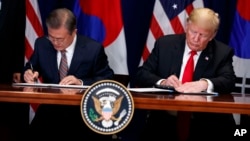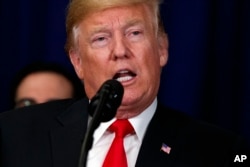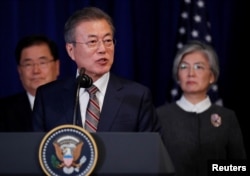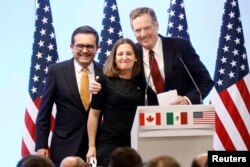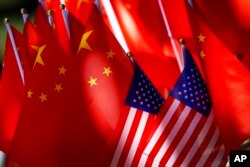U.S. President Donald Trump and South Korean President Moon Jae-in signed a revised free trade agreement between the two countries Monday afternoon in New York, following their bilateral meeting on the sidelines of the United Nations General Assembly (UNGA).
"I'm very excited about our new trade agreement," Trump said during a joint press conference with Moon. "This is a brand new agreement. This is not an old one rewritten. ... I'm very excited about that for the United States, and I really believe it's good for both countries."
Trump called the signing "a historic milestone in trade" and "something that most people thought was not going to be happening."
Speaking through an interpreter, Moon called the revision of the free trade agreement "significant, in the sense that it expands the ROK-U.S. alliance to the economic realm, as well."
"With the swift conclusion of the negotiations for the revision, uncertainty surrounding our FTA (Free Trade Agreement) have been eliminated," he said, adding that "as a result, companies from both countries will now be able to do business under more stable conditions."
The new deal contains amendments to the 2012 U.S.-South Korea free trade deal known as KORUS, which Washington and Seoul agreed to revise in March.
Trump had previously blamed KORUS, signed during the Obama administration, for increasing U.S. trade deficits with South Korea.
The amendments include provisions to ease customs barriers for U.S. agricultural goods and pharmaceutical exports. It will increase the number of cars the U.S. can export to South Korea, from 25,000 to 50,000, without being subject to the country's more stringent safety regulations.
Seoul also accepted a quota on its steel exports to the U.S. to avoid the tariffs Trump has imposed on other countries.
The new deal, however, does not include a currency agreement as members of the Trump administration had previously indicated.
NAFTA deal
Meanwhile, the U.S. and Canada are still trying to work out a deal on a new North American Free Trade Agreement (NAFTA). Canadian Prime Minister Justin Trudeau told reporters in Montreal on Sunday that negotiators are "very likely" to hold informal talks on the sidelines of the UNGA.
Trump struck a side deal on the three-nation trade agreement with Mexico last month and has threatened to exclude Canada. His administration wants to reach an agreement by the end of September.
Canada says it does not feel bound by any deadlines. Trudeau reiterated his position that he would not sign a bad NAFTA deal.
In a blog for the conservative-leaning Heritage Foundation, economist Tori Whiting wrote that under the new KORUS agreement, Washington "failed to fully achieve the goal of eliminating tariff and non-tariff barriers." She added that protectionist tariffs "should remain dormant under a new NAFTA."
US-China tariffs
Also on Monday, a new round of U.S.-imposed duties on $200 billion worth of Chinese goods, and a retaliatory set of tariffs imposed by Beijing on $60 billion worth of U.S. goods took effect.
The new U.S. duties cover thousands of Chinese-made products, including electronics, food, tools and housewares. The new tariffs begin at 10 percent, and will rise to 25 percent on Jan. 1, 2019.
In a policy statement, Beijing accused Washington of using tariffs as a means of intimidating other countries to submit to U.S. wishes on economic matters.
"We have now reached a stalemate," Eswar Prasad, senior fellow at Brookings Institution, said in his podcast, "where neither side can be seen as caving in to each other's demands, potentially signaling that we could be in for a long-standing trade war."
Prasad added that it seems clear Trump "wants nothing less than total capitulation by the Chinese side on all American demands."
This includes, he said, not just measures by China to reduce the trade deficit, but also other issues that the U.S. has long been concerned about, such as "better protection of intellectual property rights of American companies, better access to Chinese markets for American investors, as well as American manufacturers."
The U.S. has already imposed tariffs on $50 billion worth of Chinese goods, and China has retaliated on an equal amount on U.S. goods.
Earlier this month, Trump threatened more tariffs on Chinese goods — another $267 billion worth of duties that would cover virtually all the goods China imports to the United States.




